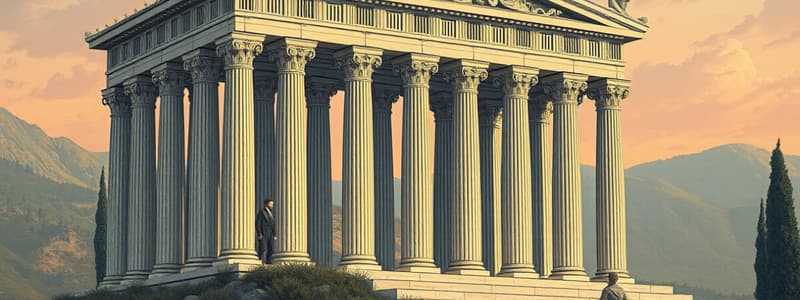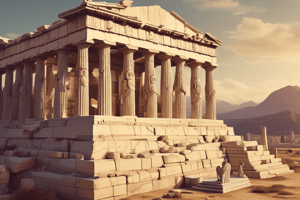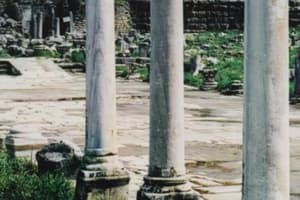Podcast
Questions and Answers
What was the first Greek civilization?
What was the first Greek civilization?
Mycenae
What type of literature is 'The Odyssey'?
What type of literature is 'The Odyssey'?
epic poem
What term refers to a Greek city, town, or village and surroundings?
What term refers to a Greek city, town, or village and surroundings?
polis
What is the important Greek colony city on the Bosporus Strait?
What is the important Greek colony city on the Bosporus Strait?
What is the Athenian vote of banishment called?
What is the Athenian vote of banishment called?
What period is referred to as the height of Athenian power and brilliance?
What period is referred to as the height of Athenian power and brilliance?
What is the sacred shrine where a priest reveals the future called?
What is the sacred shrine where a priest reveals the future called?
What is the famous temple of Athena called?
What is the famous temple of Athena called?
Who is considered the founder of Stoicism?
Who is considered the founder of Stoicism?
What age began with Alexander the Great's conquests?
What age began with Alexander the Great's conquests?
Why did so many different communities develop independent ways of life in ancient Greece?
Why did so many different communities develop independent ways of life in ancient Greece?
What historical event do scholars debate Homer's account of?
What historical event do scholars debate Homer's account of?
What does the term 'oligarchy' refer to in the context of the government of Sparta?
What does the term 'oligarchy' refer to in the context of the government of Sparta?
Why did large numbers of Greeks establish colonies in distant lands between 750 B.C. and 550 B.C.?
Why did large numbers of Greeks establish colonies in distant lands between 750 B.C. and 550 B.C.?
According to legends, how did the people in Athens find out what happened at the Battle of Marathon?
According to legends, how did the people in Athens find out what happened at the Battle of Marathon?
Why did the Athenians stay within their walled city during the Peloponnesian Wars?
Why did the Athenians stay within their walled city during the Peloponnesian Wars?
Who said that 'the unexamined life is not worth living'?
Who said that 'the unexamined life is not worth living'?
What did the Athenian dramatist Euripides write?
What did the Athenian dramatist Euripides write?
What was the result of Alexander the Great's conquests?
What was the result of Alexander the Great's conquests?
Why, according to legend, did Archimedes run through town shouting 'Eureka'?
Why, according to legend, did Archimedes run through town shouting 'Eureka'?
What did Herodotus write that is considered to be the first of its kind?
What did Herodotus write that is considered to be the first of its kind?
At its height, how far east did Alexander's empire extend?
At its height, how far east did Alexander's empire extend?
Flashcards are hidden until you start studying
Study Notes
Greek Civilization and Literature
- Mycenae represents the first Greek civilization, known for its advancements and influence.
- The Odyssey is categorized as an epic poem, a significant form of ancient Greek literature.
City-States and Colonization
- A polis refers to a Greek city, including towns and surrounding areas, functioning as an independent political unit.
- Byzantium was an important Greek colony located on the Bosporus strait, serving as a critical trade and cultural center.
- During 750-550 B.C., large numbers of Greeks established colonies to escape overcrowding and seek fertile land.
Political and Cultural Developments
- Ostracism was a process in Athens allowing citizens to vote for banishment of individuals deemed threats to the state.
- The Age of Pericles marks a peak in Athenian power and cultural achievements.
- The government of Sparta was an oligarchy, indicating rule by a small elite group.
Religion and Philosophy
- An oracle was a sacred shrine where priests provided prophetic insights regarding the future.
- The Parthenon, a temple dedicated to Athena, symbolizes ancient Greek architectural mastery.
- Socrates famously asserted, "the unexamined life is not worth living," emphasizing the importance of self-reflection.
Historical Figures and Events
- Zeno is recognized as the founder of Stoicism, a philosophy advocating virtue and wisdom.
- Demographic isolation due to mountainous terrain led various communities in ancient Greece to develop distinct lifestyles.
- Herodotus is credited with writing the first historical account in Western civilization.
Alexander the Great and His Legacy
- The Hellenistic Era began with Alexander the Great's conquests, facilitating the spread of Greek culture across Southeast Asia.
- Alexander's empire ultimately stretched to Pakistan, illustrating the vast reach of his conquests.
- Following his campaigns, Greek language, art, architecture, and literature flourished across the regions he conquered.
Notable Events and Innovations
- The Battle of Marathon was relayed to Athenians by Pheidippides, who heroically ran from the battlefield to the city.
- During the Peloponnesian Wars, Pericles advised Athenians to stay within city walls, believing they could withstand Spartan attacks.
- Archimedes famously exclaimed "Eureka!" after discovering principles of specific gravity while bathing, illustrating the intersection of science and daily life.
- Euripides, an Athenian dramatist, is known for creating realistic tragedies that depict the horrors of war, showing a shift in narrative style.
Additional Insights
- Scholars debate the historical accuracy of Homer's account pertaining to the sacking of Troy by Mycenaeans led by King Agamemnon, highlighting the intersection of myth and history.
Studying That Suits You
Use AI to generate personalized quizzes and flashcards to suit your learning preferences.




